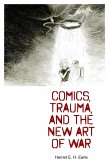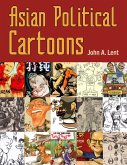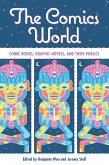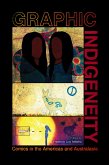Contributions by Lawrence Abrams, Diana Álvarez Amell, Partha Bhattacharjee, Natalja Chestopalova, Jim Coby, Rita Costello, Sam Cowling, Joanna Davis-McElligatt, Elisabetta Di Minico, Kiera M. Gaswint, Vincent Haddad, Kaleb Knoblauch, Christina M. Knopf, Leah Milne, Jacob Murel, Priyanka Tripathi, and Steven S. Vrooman
In 1954, the culture, distribution, and content of comics forever changed. Long a mainstay of America's reading diet, comic books began to fall under the scrutiny of parent groups, church leaders, and politicians. The bright colors and cheaply printed pulp pages of comic books that had once provided an escape were suddenly presumed to house something lascivious, insidious, and morally corrosive. While anxieties about representations of violence in comics have largely fallen to the wayside since the moral panic of the 1950s, thematic and symbolic visual depictions of violence remain central to the comics form. BOOM! SPLAT! Comics and Violence examines violence in every iteration-physical violence enacted between people and their environments, formal and structural violence embedded in the comics language itself, representations of historical violence, and ways of reading and seeing violence.
BOOM! SPLAT! is composed of fifteen essays from renowned comics scholars and is organized thematically into four sections, including an examination of histories of violence, forms of violence, modes and systems of violence, and political and social violence. Chapters focus on well-known comics and comics creators, such as Steve Ditko, Hulk, X-Men, and the Marvel universe, to newspaper cartoon strips, postwar graphic novels, revolution, civil rights, trauma, #blacklivesmatter, and more. BOOM! SPLAT! serves as a resource to scholars and comics enthusiasts who wish to contemplate and confront the permutations, forms, structures, and discourses of violence that have always animated cartoons.
Through this interrogation, our understanding of violence moves beyond the immediately physical and interpersonal into modes of ephemeral, psychological, and ideological violence. Contributors fill critical gaps by offering sustained explorations of the function of manifold violences in the comics language-those seen, felt, and imagined. The essays in this collection are critically necessary for understanding the current and historical role that violence has played in comics and will help recognize how cartooning imbricates, resists, and expands our thinking about and experiences of violence.
In 1954, the culture, distribution, and content of comics forever changed. Long a mainstay of America's reading diet, comic books began to fall under the scrutiny of parent groups, church leaders, and politicians. The bright colors and cheaply printed pulp pages of comic books that had once provided an escape were suddenly presumed to house something lascivious, insidious, and morally corrosive. While anxieties about representations of violence in comics have largely fallen to the wayside since the moral panic of the 1950s, thematic and symbolic visual depictions of violence remain central to the comics form. BOOM! SPLAT! Comics and Violence examines violence in every iteration-physical violence enacted between people and their environments, formal and structural violence embedded in the comics language itself, representations of historical violence, and ways of reading and seeing violence.
BOOM! SPLAT! is composed of fifteen essays from renowned comics scholars and is organized thematically into four sections, including an examination of histories of violence, forms of violence, modes and systems of violence, and political and social violence. Chapters focus on well-known comics and comics creators, such as Steve Ditko, Hulk, X-Men, and the Marvel universe, to newspaper cartoon strips, postwar graphic novels, revolution, civil rights, trauma, #blacklivesmatter, and more. BOOM! SPLAT! serves as a resource to scholars and comics enthusiasts who wish to contemplate and confront the permutations, forms, structures, and discourses of violence that have always animated cartoons.
Through this interrogation, our understanding of violence moves beyond the immediately physical and interpersonal into modes of ephemeral, psychological, and ideological violence. Contributors fill critical gaps by offering sustained explorations of the function of manifold violences in the comics language-those seen, felt, and imagined. The essays in this collection are critically necessary for understanding the current and historical role that violence has played in comics and will help recognize how cartooning imbricates, resists, and expands our thinking about and experiences of violence.
Dieser Download kann aus rechtlichen Gründen nur mit Rechnungsadresse in A, D ausgeliefert werden.









